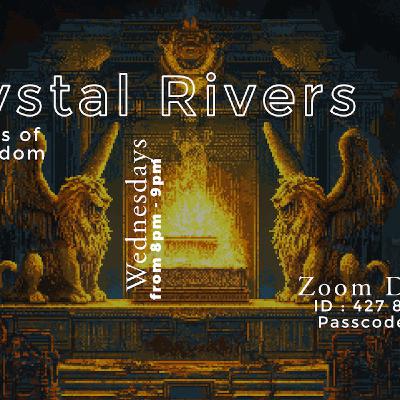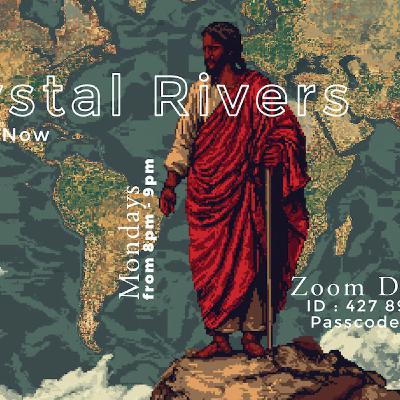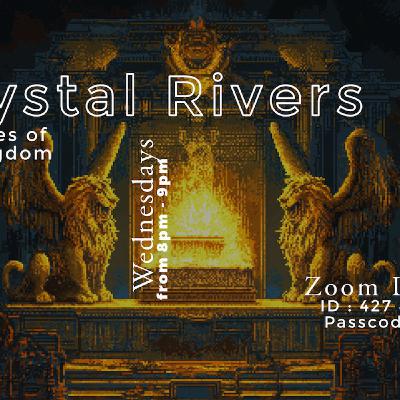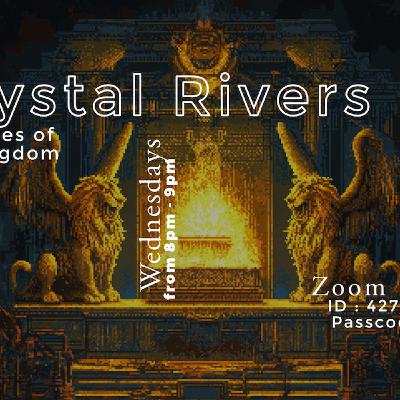Breaking Free from Familiar Spirits Through Divine Communion | Kingdom Mysteries | Oct 8, 2025 | CR
Update: 2025-10-08
Description
Crystal Rivers | Kingdom Mysteries | Oct 8, 2025
Understanding the spiritual reality of your walk with God requires recognizing that you were designed as a dwelling place for the fullness of divine presence. Your soul functions like a multi-story tower, with different levels representing various depths of consciousness and fellowship with the Lord. At each level, there should be communion with God, aided by angels who help facilitate that dialogue and relationship. However, when fellowship with God is absent at any level, darkness fills those voids by default—not as punishment, but as the natural consequence of disconnection.
This darkness manifests through familiar spirits, entities that become intimately acquainted with your behavioral patterns, thought processes, and life cycles. The word "occult" means to hide or conceal, and these spirits derive their power from keeping you blind and disconnected from God's presence. They embed themselves in the hidden places of your life, conforming themselves to your routines and habits, speaking in first person within your mind so convincingly that you believe their voice is your own. They fuel gossip, create cravings for information and affirmation, and generate internal arguments where you find yourself debating contradictory desires. Their primary goal is not necessarily to bring material loss or physical sickness, but to prevent fellowship with God.
The Melchizedek priesthood, which Abraham entered when he received bread and wine from Melchizedek, represents a higher order of communion where you become both the priest and the sacrifice. Unlike the Levitical priesthood that offered external sacrifices, this priesthood makes you the epicenter of God's power. You are called to digest God, to eat the reality of Christ, to discover your union with Him so completely that His presence doesn't just indwell your spirit but permeates every level of your consciousness, flowing into your soul and physical body.
True repentance is not merely verbal apology or emotional tears of guilt. It is the active restoration of fellowship with God in the specific area where you disconnected. When you sin, you offer that part of yourself as a sacrifice to darkness through communion with it. Repentance means pulling away from that communion and presenting that same area to the Lord, lingering in His presence until His righteousness—which Christ has already secured for you—actually lands on and transforms that region of your soul. You must remain in dialogue with God, wrestling and crying out, not from condemnation but from genuine desire to reconnect, until your heart bursts aflame with conviction so strong that you can truthfully swear an oath: "I will never do this again."
Confession, in biblical terms, is not the repetitive verbal declaration of words but the overflow of a heart so filled with God's truth that it erupts in conviction. Like the Israelites who cried all night that they wished they had died in the wilderness, and God responded "as you have said, so shall it be," your confession carries creative power when it flows from genuine heart persuasion. You must fill your heart by meditating on Scripture, shutting yourself off from contrary voices, until agreement with God's word registers so deeply in your soul that the declaration becomes inevitable and irrevocable.
You are a priest after the order of Melchizedek. This means you don't delegate your spiritual responsibility to external rituals or religious performances. You are the altar where God meets humanity. You are the sacrifice being offered. You are the one God inhabits and transforms. The power of this priesthood lies in making you the living, breathing focal point of divine presence. When you present your body as a living sacrifice—holy and acceptable to God—you're not performing religious duty; you're engaging the most powerful spiritual reality available: union with Christ through active, intentional, persistent communion.
Your Christian walk is meant to be a continuous feast, digesting the reality of who God is until it becomes your conscious experience, not just theological knowledge. The Feast of Tabernacles represents the goal: God fully dwelling with you, His presence so enriched beyond your spirit into your soul and body that He becomes physically tangible in your experience. This requires dealing honestly with every area where familiar spirits have established patterns, breaking those cycles not through mere willpower but through priestly sacrifice—offering those broken places to God in sustained fellowship until His life displaces the darkness that has occupied those spaces.
Zoom every weekday : http://www.caveadullam.org/zoom
Understanding the spiritual reality of your walk with God requires recognizing that you were designed as a dwelling place for the fullness of divine presence. Your soul functions like a multi-story tower, with different levels representing various depths of consciousness and fellowship with the Lord. At each level, there should be communion with God, aided by angels who help facilitate that dialogue and relationship. However, when fellowship with God is absent at any level, darkness fills those voids by default—not as punishment, but as the natural consequence of disconnection.
This darkness manifests through familiar spirits, entities that become intimately acquainted with your behavioral patterns, thought processes, and life cycles. The word "occult" means to hide or conceal, and these spirits derive their power from keeping you blind and disconnected from God's presence. They embed themselves in the hidden places of your life, conforming themselves to your routines and habits, speaking in first person within your mind so convincingly that you believe their voice is your own. They fuel gossip, create cravings for information and affirmation, and generate internal arguments where you find yourself debating contradictory desires. Their primary goal is not necessarily to bring material loss or physical sickness, but to prevent fellowship with God.
The Melchizedek priesthood, which Abraham entered when he received bread and wine from Melchizedek, represents a higher order of communion where you become both the priest and the sacrifice. Unlike the Levitical priesthood that offered external sacrifices, this priesthood makes you the epicenter of God's power. You are called to digest God, to eat the reality of Christ, to discover your union with Him so completely that His presence doesn't just indwell your spirit but permeates every level of your consciousness, flowing into your soul and physical body.
True repentance is not merely verbal apology or emotional tears of guilt. It is the active restoration of fellowship with God in the specific area where you disconnected. When you sin, you offer that part of yourself as a sacrifice to darkness through communion with it. Repentance means pulling away from that communion and presenting that same area to the Lord, lingering in His presence until His righteousness—which Christ has already secured for you—actually lands on and transforms that region of your soul. You must remain in dialogue with God, wrestling and crying out, not from condemnation but from genuine desire to reconnect, until your heart bursts aflame with conviction so strong that you can truthfully swear an oath: "I will never do this again."
Confession, in biblical terms, is not the repetitive verbal declaration of words but the overflow of a heart so filled with God's truth that it erupts in conviction. Like the Israelites who cried all night that they wished they had died in the wilderness, and God responded "as you have said, so shall it be," your confession carries creative power when it flows from genuine heart persuasion. You must fill your heart by meditating on Scripture, shutting yourself off from contrary voices, until agreement with God's word registers so deeply in your soul that the declaration becomes inevitable and irrevocable.
You are a priest after the order of Melchizedek. This means you don't delegate your spiritual responsibility to external rituals or religious performances. You are the altar where God meets humanity. You are the sacrifice being offered. You are the one God inhabits and transforms. The power of this priesthood lies in making you the living, breathing focal point of divine presence. When you present your body as a living sacrifice—holy and acceptable to God—you're not performing religious duty; you're engaging the most powerful spiritual reality available: union with Christ through active, intentional, persistent communion.
Your Christian walk is meant to be a continuous feast, digesting the reality of who God is until it becomes your conscious experience, not just theological knowledge. The Feast of Tabernacles represents the goal: God fully dwelling with you, His presence so enriched beyond your spirit into your soul and body that He becomes physically tangible in your experience. This requires dealing honestly with every area where familiar spirits have established patterns, breaking those cycles not through mere willpower but through priestly sacrifice—offering those broken places to God in sustained fellowship until His life displaces the darkness that has occupied those spaces.
Zoom every weekday : http://www.caveadullam.org/zoom
Comments
In Channel




















